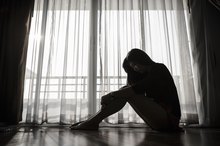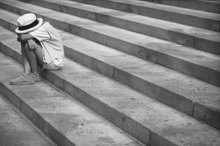Anti Anxiety Drugs That Don't Make You Sleepy
All medications have the potential to make people drowsy, anti-anxiety medications included. However, some anti-anxiety medications are also prescribed as sleeping pills or muscle relaxants. These include the benzodiazepines alprazolam, or Xanax, and diazepam, or Valium. Because of their relaxing effects, they are bound to induce some drowsiness in people who are not tolerant to the drugs. Other common anti-anxiety medications, such as selective serotonin reuptake inhibitors, or SSRIs, beta blockers and the dietary supplement 5-Hydroxytryptophan, or 5-HTP, do not normally cause sleepiness.
If you are experiencing serious medical symptoms, seek emergency treatment immediately.
Selective Serotonin Reuptake Inhibitors
SSRIs are anti-depressant medications that prevent serotonin from being reabsorbed into the neurons in the brain. This inhibitory effect increases the brain's levels of serotonin, which in turn regulates fear processing in the brain via the 5-HT1A serotonin receptor, according to a research team in a March 2009 issue of Cerebral Cortex. As of 2010, the only SSRI officially approved for anxiety is escitalopram, or Lexapro. But as a low level of serotonin in the brain is the main trigger of anxiety, most of the SSRIs also have anti-anxiety effects, according to a review published in the August 2010 issue of Expert Review of Neurotherapeutics 2.
SSRIs may cause drowsiness and sleepiness the first few days after starting the drugs. But these side effects should disappear over time. Higher than recommended doses of SSRIs may continue to produce sleepiness and other side effects.
- SSRIs are anti-depressant medications that prevent serotonin from being reabsorbed into the neurons in the brain.
- But as a low level of serotonin in the brain is the main trigger of anxiety, most of the SSRIs also have anti-anxiety effects, according to a review published in the August 2010 issue of Expert Review of Neurotherapeutics 2.
Beta Blockers
Can I Take 5-HTP With Effexor?
Learn More
Beta blockers are heart medications that prevent excess adrenaline secreted by the adrenaline glands from causing a toxic heart. According to a study published in the April 2009 issue of the American Journal of Cardiology, a toxic heart occurs when extreme surges of adrenaline stunt or weaken the heart 3. This condition is also known as "stress cardiomyopathy." Beta blockers can prevent these symptoms by blocking adrenaline receptors on the heart muscle. Beta blockers also bind to receptors on the smooth muscles of blood vessels, causing respiration to slow down.
Since a major component of an anxiety attack is an increase in heart beat, heart contraction and respiration, beta blockers can take the edge off the symptoms of most forms of anxiety. They also seem to reduce muscle tremors. Beta blockers, however, only treat the symptoms of anxiety. They are therefore not recommended as a treatment of anxiety disorders that affect people on a daily basis. But they are among the most frequently prescribed drugs for performance anxiety. Low doses of beta blockers do not normally cause sleepiness.
- Beta blockers are heart medications that prevent excess adrenaline secreted by the adrenaline glands from causing a toxic heart.
- Beta blockers can prevent these symptoms by blocking adrenaline receptors on the heart muscle.
5-Hydroxytryptophan
5-HTP is an over-the-counter dietary supplement that turns into serotonin after crossing the blood-brain barrier. 5-HTP is naturally synthesized from the protein building block L-tryptophan, which is found in most dietary proteins. According to a review published in the January 2002 issue of Cochrane Database of Systematic Reviews, there is some scientific evidence that 5-HTP is more effective than placebo in elevating serotonin levels. When taken in small doses, 5-HTP does not normally cause sleepiness.
However, not enough evidence is available to determine the precise efficacy and safety of the supplement. The researchers suggest that there may be a correlation between 5-HTP and eosinophilia-myalgia syndrome, a potentially fatal and incurable neurological condition.
- 5-HTP is an over-the-counter dietary supplement that turns into serotonin after crossing the blood-brain barrier.
- The researchers suggest that there may be a correlation between 5-HTP and eosinophilia-myalgia syndrome, a potentially fatal and incurable neurological condition.
Related Articles
References
- "Cerebral Cortex"; Medial Prefrontal Cortex 5-HT2A Density Is Correlated with Amygdala Reactivity, Response Habituation, and Functional Coupling; Patrick M. Fisher, et al.; March 2009
- "Expert Review of Neurotherapeutics"; Selective Serotonin-Reuptake Inhibitors in the Treatment of Panic Disorder: A Systematic Review of Placebo-Controlled Studies; Marina Dyskant Mochcovitch and Antonio Egidio Nardi; August 2010
- "The American Journal of Cardiology"; Clinical Characteristics and Four-Year Outcomes of Patients in the Rhode Island Takotsubo Cardiomyopathy Registry; Regnante, et al.; April 2009
- "Cochrane Database of Systematic Reviews"; Tryptophan and 5-Hydroxytryptophan for Epression; Shaw, et al.; October 2001
- Cinculova A, Prasko J, Kamaradova D, et al. Adherence, self-stigma and discontinuation of pharmacotherapy in patients with anxietydisorders - cross-sectional study. Neuro Endocrinol Lett. 2017 Dec;38(6):429-426.
- Gomez AF, Barthel AL, Hofmann SG. Comparing the efficacy of benzodiazepines and serotonergic anti-depressants for adults with generalized anxiety disorder: a meta-analytic review. Expert Opin Pharmacother. 2018 Jun;19(8):883-894. doi: 10.1080/14656566.2018.1472767. Epub 2018 May 28.
Writer Bio
Dr. Berit Brogaard has written since 1999 for publications such as "Journal of Biological Chemistry," "Journal of Medicine and Philosophy" and "Biology and Philosophy." In her academic research, she specializes in brain disorders, brain intervention and emotional regulation. She has a Master of Science in neuroscience from University of Copenhagen and a Ph.D. in philosophy from State University of New York at Buffalo.









